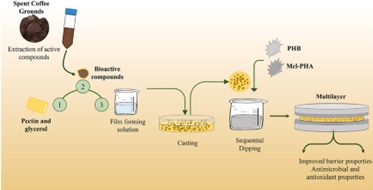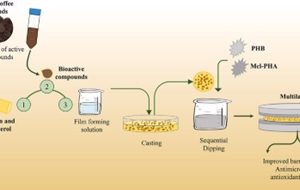Seyedeh Fatemeh Mirpoor, Iolanda Corrado, Rocco Di Girolamo, Giovanni Dal Poggetto, Lucia Panzella, Elisabetta Borselleca, Cinzia Pezzella, C. Valeria L. Giosafatto
Polymer, Volume 281, 18 July 2023, 126136 https://doi.org/10.1016/j.polymer.2023.126136
Abstract
Biodegradable active packaging, i.e. materials able to promote food preservation while avoiding plastic waste accumulation are expecting to play a key role fsor the manufacture of new generation materials.
Bioactive films composed of citrus pectin (CP) added with extracts from spent coffee grounds (SCGs) were herein developed. To address the limitations of pectin-based materials, i.e. hydrophilicity and poor water barrier properties, an active multilayer film was prepared by coating the functionalized pectin by a two-steps dipping into polyhydroxyalkanoates (PHA) solutions characterized by different monomeric compositions. The PHA coating affected the stiffness of the film and its opacity, while improving its hydrophobicity and water vapor permeability. The dipping procedure did not compromise the stability of the bioactive compounds, rather it allowed to preserve their antioxidant and antimicrobial activities for longer times in comparison with uncoated functionalized film. Further, the multilayer material functionalized with extracts was able to delay the carotenoid degradation in mashed carrots likely because of the increased film opacity conferred by both phenols (caffeoylquinic acid isomers including chlorogenic acid) found in SCGs and PHAs layer suggesting that the new material may be used to extend the food shelf-life and potentially to enhance product health credentials.

